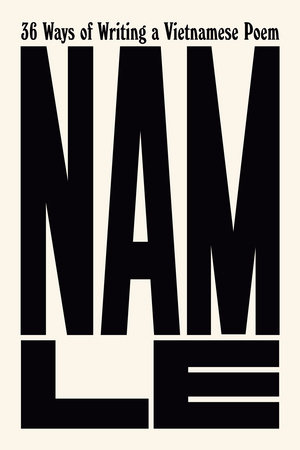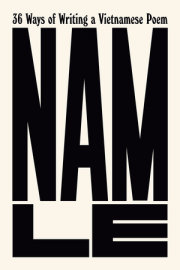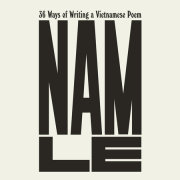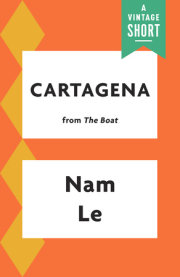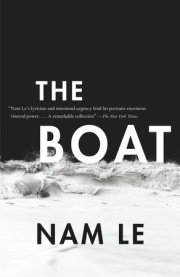"Each poem in 36 Ways of Writing a Vietnamese Poem stings as if Nam Le burned syllables onto the page with a pyrographic pen. These poems seethe and sing; they restlessly shapeshift as Nam Le tries to find a mode of speech or form that could capture the violent history of war and the experience of deracination. But the English language stops short and he captures that gap—and the unspeakable realms of racialized consciousness—with virtuousic and ineffable beauty." —Cathy Park Hong, author of Minor Feelings
"With a cool outsider’s eye, Nam Le takes the English language to pieces and reassembles it with a virtuoso ease not seen since Finnegans Wake. There is wit aplenty, of a dancing, ironic kind, but the fury and the bitterness that underlie 36 Ways come without disguise, as do its moments of aching love and loss. Nam Le is a poet working at the height of his powers. Each of the poems comes with its own explosive charge; taken together, they are capable of shaking Western self-regard to its foundations." —J.M. Coetzee, Nobel Laureate 2003
"[With] verse that's pick-axe vivid and almost breathlessly propulsive....This brief, potent book offers a fresh understanding of diaspora; readers of contemporary poetry will seek it out."—Barbara Hoffert, Library Journal, starred review*
"Sophisticated....Shimmering... [with] the discrete, full-bodied evocations of...Ulysses...[Nam Le takes] a poetically succinct odyssey through the conventions of diasporic writing... and across the deformations of history."—David Woo, Literary Hub
"Exquisitely crafted fire bombs of incandescent rage. Moving and powerful." —Nick Cave
"Nam Le’s latest work represents a radical restatement of modern poetry. The poet, evoking Walt Whitman and Wallace Stevens, becomes the “aperture” that sharply captures multitudinous poetic traditions."—Thúy Ðinh, NPR
"For his debut book of poems, [Nam] Le's propulsive lyrics center the culture, language, and history of the author's native Vietnam. Refracted through 36 lenses, the poems range from a handful of words to many stanzas and pages as they probe questions of sincerity, authenticity, and legacy...A much-awaited work by an important writer of our times."—Diego Báez, Booklist
"36 Ways slices at certainty with rage, humour and tenderness. Read it even if you’ve never gone near a poem in your life – for the relentless instability, generous intellectual tapestry, and for the last few pages: a slow, beautiful ambush that made me want to lie down and die (in a good way)."—The Guardian (Australia)
"36 Ways is restless, ever-shifting from one technique to another… a poem listening to itself, dissatisfied with its own form and its own conventions. That restlessness of voice, that refusal to be boxed in… becomes a way forward. Reading 36 Ways, thinking with it, I feel the walls recede – just a little." —André Dao, The Saturday Paper
"Nam Le’s defiantly cerebral verses shuffle the deck of identity, belonging and being … [T]he poetry is meticulous and skilled – the work of a poet who has lived with poetry for the longest time."—The Conversation
"36 Ways of Writing a Vietnamese Poem by Nam Le is a rallying call for freedom – from representation, history and language...driven by rage and violence...[For] anyone who has felt lost in the sea of identity, ‘never fully anything’ as Le puts it, this extraordinary collection points a way to how you might feel found." —Nirmala Devi, ArtReview
"36 Ways hums with the furious desire for, above all else, a private, uncategorised soul... Le’s searing vignettes of deep familial love and hurt have been on my mind for days." —Imogen Dewey, The Guardian
"In Nam Le's 36 Ways of Writing a Vietnamese Poem, we find a 36-headed speaker wrestling with history, inheritance, trauma, and slippery selfhood—but thankfully, self-seriousness has been sent out to pasture, and in its place, we are greeted by a quicksilver intellect that shatters every convention to create something utterly new." —Leslie Jamison, New York Magazine
"Where do we locate meaning when we know a word can collapse in on itself at any moment, leaving just the earthy music at its core? Somehow these poems have me dancing above that sinkhole, flirting with its mayhem. Nam Le’s debut collection 36 Ways of Writing a Vietnamese Poem is, like the poet, a chimera of ferocious wit, lyricism and play. But this book is deadly serious. Le leaves no doubt that he means it. He means every word of it."—Gregory Pardlo, author of Spectral Evidence
"A masterly performance. With defiant playfulness and wit Nam Le dramatises for us (for 'You') the challenging contradictions of being a writer in the 'Unself-consciousness' of the Vietnamese diaspora." —David Malouf, author of Remembering Babylon
"Le’s verve and uncanny ear for language drive this stunning collection that explores the varied and often tense ways of living as part of the Vietnamese diaspora. The book simultaneously dismantles linguistic and hegemonic forces of violence which plague the diasporic condition and also threads a fine lyric in which I felt deeply moved. In Le’s poems, I am both witness and can find myself in the larger tapestry. This book is fine electricity."—Diana Khoi Nguyen, author of Ghost Of
"Nam Le’s exhilarating 36 Ways of Writing a Vietnamese Poem is not just highly inventive but deeply compelling. The lively poetics of the book goes something like this: “The house in my head / I name home. / Though where I’m really from / The dead bird stays dead.” The poems move swiftly in a kind of syncopated telegraphic language creating a direct confrontation with all that they interrogate, braiding language, culture, translation, migration, history, and poetry itself. The writing is lyrical, musical, intelligent, and beautiful. It’s a great book." —Peter Gizzi, author of Fierce Elegy
“From the opening lines, I knew this book would gut me. I wasn’t wrong. 36 Ways of Writing a Vietnamese Poem is an exhaustive examination of the complex stew of emotions every displaced person experiences. In Nam Le’s deft hands, deep scholarship is transformed into a nimble, nuanced romp, replete with devastating wit, sonic acrobatics, and superb mouth feel. I’ve been waiting for this book all my diasporic life.” —Barbara Tran, author of Precedented Parroting

